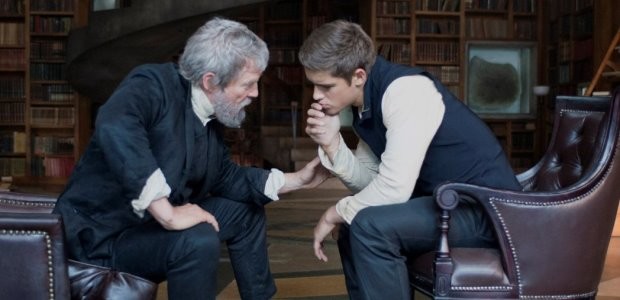Based on a 1993 bestselling novel of the same name, The Giver is the latest sci-fi adventure aimed at a middle-school audience. While the film is visually arresting, it can only be fully appreciated by an audience with a high capacity to suspend reality.
Stemming from novelist Lois Lowry’s highly imaginative vision of the future, the story is set decades after society has been rebuilt following a total socio-political collapse. It is a purpose built utopia where citizens have no memories of the past. And because there are no memories of a time before theirs, there is no pain, no disease, no hunger, no malice, no rich or poor, and basically none of the social ills we see in the world today. Best of all, there is no colour, thereby eliminating racial and ethnic differences. It’s an ideal society, but not perfect. Teenager Jonas (Brenton Thwaites) is the first to question strict laws imposed by the all-seeing, all-hearing council of Elders. As the protagonist, Jonas has an innate ability to see things differently, including flashes of colour in the world around him. This leads him on a quest to discover why his pristine society is void of deep emotions, last names and even biological parents. Things change for the worse when Jonas is elected as The Receiver of Memory, an assignment with great power but also greater responsibility.
Taken under the wing of The Giver (Jeff Bridges), an Elder who holds historical memories as a sort of key between the past and the future, Jonas sees for the first time, the true beauty of civilization but also humanity’s darker side – memories of love and laughter and various significant moments in human history but also visions of war, suffering and loss. The whole purpose is to guide Elders in times of conflict by avoiding mistakes made in the past. But what good is all this knowledge when there is no conflict at all? Turns out, there’s always trouble if you go looking for it. Meryl Streep leads the charge as The Chief Elder, a polite but fascist matriarch, and out of nowhere Jonas faces peril for the first time, after falling in love with fellow citizen Fiona (Odeya Rush) and telling her how the world used to be. This is when we realize that this society is more dystopian than meets the eye. No surprise there, but it’s at this point where you also start to ask a lot of questions arising from gaping holes in the story. Unfortunately, you won’t find complete answers due to the shoddy screen adaptation. Still, one can only hope for more clarity in a sequel given that The Giver is adapted from a quartet.
Most remembered for mid-90s espionage thrillers Patriot Games and its sequel, director Phillip Noyce appears to have his heart in the right place with crisp visualizations of Lowry’s utopian society. It’s a different matter when it comes to adapting Lowry’s ideological musings on where utopia ends and dystopia begins. Another problem is how late in the game this film is considering its proximity to almost identical themes in Divergent and The Hunger Games. It’s a pity because The Giver is sourced from archetype philosophy that probably inspired the conception of those films but its late production means it has missed the early boat to teen fantasy island. Then again, it’s not all bad. Besides stunning visuals for a mostly monochromatic film and an uplifting musical score, Veterans Bridges and Streep hold it together on opposite ends of the rope. In between are some bland turn outs from Alexander Skarsgård and Katie Holmes as Jonas’ assigned ‘Father’ and ‘Mother’. Thwaites is promising as the lead but as an upcoming actor, only a sequel will give him due recognition.
While there is every reason to bash this film, I’d still give The Giver a chance purely due to its original concept, which in theory has vast potential to rise above its peers. Let’s hope they don’t wait another twenty years to make the sequel!
Rating: 




http://www.youtube.com/watch?v=eTspwR5dEEk
